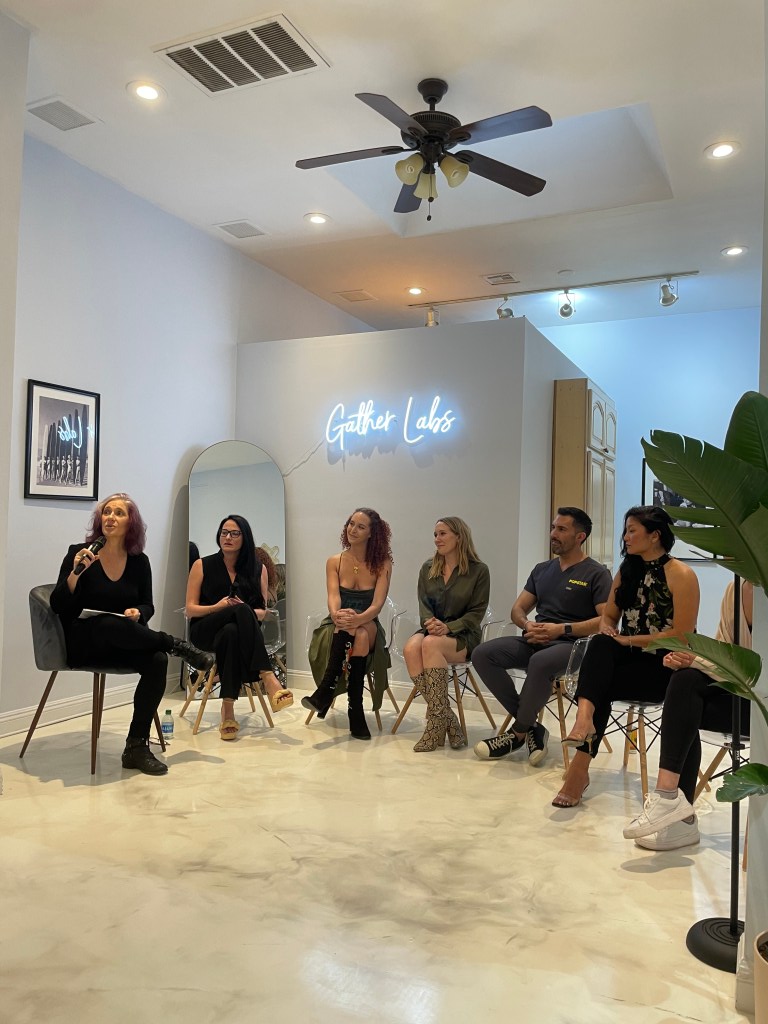
The public health crisis in Los Angeles is something no one seems to want to talk about, despite the fact that the rates have continued to rise in this country. Recent data from the CDC revealed that cases of chlamydia, gonorrhea, and syphilis all increased between 2020 and 2021 with no signs of slowing down — unless better STI awareness, prevention, testing, and treatment options are implemented throughout our society. At the forefront of this effort, as reported before, is Gather Labs, the Beverly Hills-based concierge medical testing laboratory that provides same-day test results for a variety of health conditions, including STDs.
In honor of the company’s recent expansion, the Gather Labs team hosted a special event at its Beverly Hills headquarters with some of the most prevalent and influential voices in Los Angeles, across multiple industries (from sex worker advocate and webcam model, Ginger Banks, to MD and sexual medicine specialist, Dr. Joshua R Gonzalez, to Fast Company contributor, Susan Karlin) to discuss how best to approach this timely issue.
Karlin kicked off the conversation with a simple question: how did we get here? Banks was quick to point out how COVID-19 created a “new normal” paradigm when it comes to routine testing in general. We became accustomed to routinely testing for the virus in order to make travel plans, return to the office, or enter certain venues— thereby reinforcing the importance of getting tested regularly for all types of infections to support our own health and protect others.
Rachael McCrary, the CEO and founder of Gather Labs, who previously founded saw the need for more efficient testing protocols back when the U.S. was still behind the curve in expanding access to COVID-19 testing. She launched Gather Labs to provide a new standard of diagnostics, which includes rapid STD screening— noting how the lengthy wait times for these tests often prevent people from getting tested in the first place.
Dr. Gonzalez builds upon McCrary’s point by adding how there’s also a general lack of understanding around what tests should be done in various use cases. As he put it, many gay and queer men do not realize that blood and urine panels alone may not be sufficient to detect infection — it’s also important to test localized body parts. He even hilariously tells his patients the need to “swab whatever hole you’re using” to ensure a thorough checkup.
The problem is that most of us are afraid to have these conversations with our doctors, let alone each other. One of the biggest culprits for the rise in STDs is the lack of real conversations that are had around sex in our culture. Frances Tang, panelist and founder of Awkward Essentials, pointed out that the stigmas surrounding sex persist because discussions about pleasure are still seen as taboo. If we can’t talk about human sexuality from a perspective of pleasure, how can we even begin to have honest conversations about sexual health?
These stigmas surrounding sexual health and pleasure have a significant impact on today’s youth. CDC data reveals that young people aged 15 – 24 account for nearly half of all reported STD cases in this country — many of whom lack the support and solidarity they need when infections occur. The general consensus was that if we aren’t able to normalize conversations around sexual health, safety, and pleasure, we will inevitably be left with significant educational gaps and a cloud of shame around the subject.
Hannah Hutton, panelist and co-founder of Personal Fav Co, noted that — despite the fact that sexuality is a universal part of the human experience — it is also a topic that’s often stigmatized and censored. For example, social media platforms are playing a subtle yet significant role in maintaining these taboos, as sex-positive influencers are often shadow-banned for sharing content that discusses sexual pleasure. “We literally have to spell sex ‘seggs’ just to talk about it on TikTok without being censored,” she said.
So, how do we move forward? The panelists unanimously agreed that we must first lead with education, but Rachael Kim, the co-founder of My Comma, said we cannot stop there — we also need to enact public policies and increase funding to match that education. “The U.S. government has plateaued funding for STD testing, and we have to fight to bring this back,” she said.
Ultimately, it’ll take a collective and conscious effort to overcome these challenges and its great that so many Los Angeles leaders and visionaries are taking the first steps. “You don’t have to be an expert to create a safe space for these conversations,” said Hutton. The Gather Labs event and panel discussion seems to be a great first step in creating that safe space with the hopes of expanding this important dialogue nationwide.